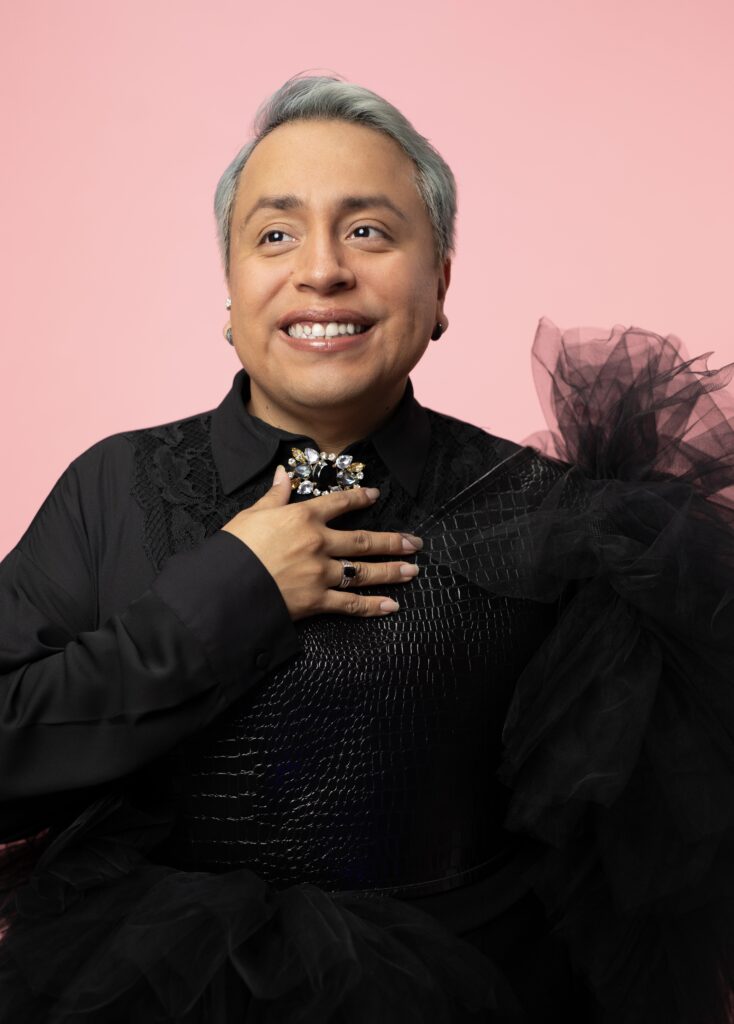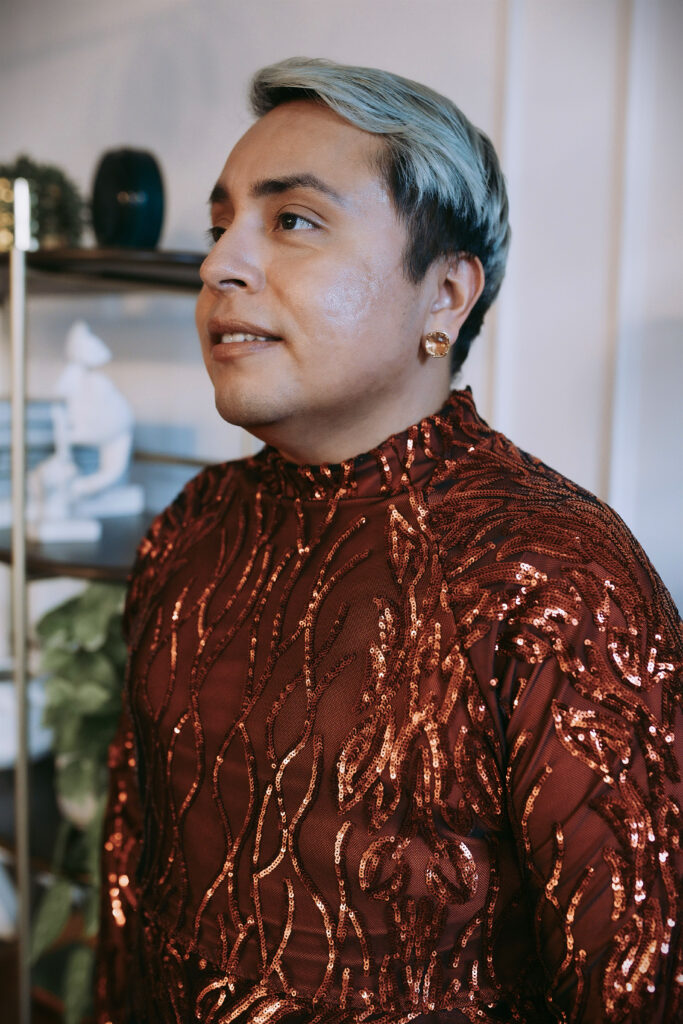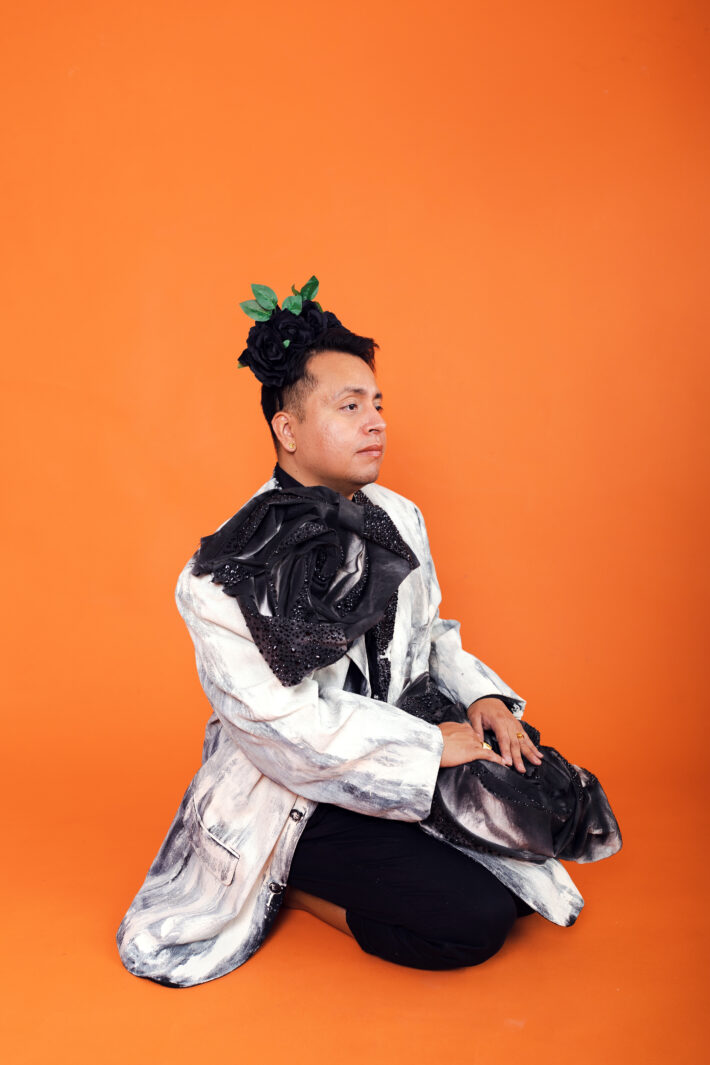How therapist and host of ‘The Queer Magic Podcast’, Luis Cornejo, is creating space for queer and BIPOC individuals in mainstream entertainment
The COVID-19 pandemic served as a period of change and reflection for many, placing more attention on mental health, wellness and addressing issues that were constantly brushed under the rug. For Luis Cornejo, the extended time at home served as period of reflection and self-discovery.
Up until the pandemic, the Los Angeles native had a hard time coming to terms with his identity as a queer Latinx individual. As Cornejo began to embrace the notion that gender is fluid and doesn’t have to adhere to traditional constructs, he began to feel angry with himself. It felt like he had cheated himself out of his true self.
“Three years ago was when I first started to realize, you know what Luis? You’re not just a gay man. You’re a queer person and that’s okay,” Cornejo said. “And queer just means that you have a lot of stuff inside of you that it just does not fit, and that is okay. And so that’s when I allowed myself and gave myself permission to really be me.”
As a licensed marriage and family therapist and certified sex therapist, Cornejo focuses on supporting LGBTQ+ and BIPOC individuals. As a queer Latinx individual, he’s able to relate to his clients on a deeper level through his shared experiences.
He uses his experiences as examples, especially for clients who identify as gender queer—a non-fixed gender identity that shifts over time—as Cornejo doesn’t adhere to the gender binary, expressing himself in masculine and feminine ways.
“Some days I’m wearing makeup and lipstick and I’m wearing my cute dress and I’m like, I love it,” he said. “And then other days I don’t feel like that.”
His primary goal is to ensure his clients have a safe space to express themselves and adds that he’s there to support others. But Cornejo’s work to create a space for queer and BIPOC folks doesn’t stop there.

This year, Cornejo embarked on a new journey, launching a new podcast called, “The Queer Magic Podcast.” In each carefully crafted episode, the therapist immerses listeners in stories from queer individuals, giving his guests a platform to share their stories.
The podcast is Cornejo’s tribute to the vibrant LGBTQ+ community and celebrating its diverse culture. The podcast becomes a technicolor mosaic, where every shade of the rainbow finds representation, acknowledgment and validation, he said.
“The Queer Magic Podcast” is more than just interviews; it’s a safe space for self-expression and a beacon of hope. He encourages his guests to be vulnerable when sharing their stories, allowing their experiences to become a source of strength to others who might be experiencing something similar.
The podcast breaks down the complexities of queer lives, dismantling stereotypes, fostering understanding and bridging the gap between various walks of like.
As he continues his journey of self-expression through clothing and makeup, Cornejo is dipping his toes into modeling. His newfound interest helps create space for others in queer and BIPOC communities of all different body types.
His ambitions go beyond the camera flashes, Cornejo’s ultimate goal is to leave a mark on mainstream entertainment by bringing authentic queer representation to the forefront. Cornejo wants to open the doors for conversations surrounding diversity and acceptance. Through his work, he’s making sure to help reshape the narrative of what beauty and success looks like without losing sight of his mission to amplify the voices of queer and BIPOC communities.
Experimenting with clothing, makeup and hair products felt liberating, said Cornejo. Diving into these newfound interests—including modeling—have helped nurture his inner child, who didn’t have the opportunity to experience this.
“It was almost like having to go back to my youth. I’m a teenager again, I’m exploring and trying on stuff,” said Cornejo. “I tried on dresses, hated them. I tried on this, loved it.”
In a world that is learning the importance of representation, Cornejo’s journey into mainstream entertainment is nothing short of revolutionary. His commitment to celebrating individuality and creating spaces that honor diversity, have the potential to reshape the industry’s landscape.
As he continues his rise, Cornejo’s influence on the intersection of fashion, beauty, entertainment and representation promises to be profound and enduring.

Here’s more of our conversation with Luis Cornejo:
Tania Ortiz: In being a queer Latinx individual in fashion, how do your identities intersect in this space?
Luis Cornejo: It’s so great to me that I’m seeing more and more inclusivity and I’m seeing a lot more representation. Beautiful, of course, there’s a lot of backlash, but that’s what happens when you see movement. Coming into this space, my intention wasn’t to end up on a Versace runway—that would be great (laughs).
I came in with the idea that when I think of a model, I think of someone that inspires. I think of someone that makes people think outside the box. And there have not been many models like me, that are 5’3 Latinx, that are a little thicker, that happen to be therapists or that happen to be Latinx and indigenous. And for me, that’s very special. I’m okay with people being like, “you’re a model?” because I get that sometimes too. And I’m like, “yeah, you could be one, too, if you want it.”
TO: How important is it for you to take up space in fashion—an environment that has been very exclusive for a long time, but is making strides towards inclusivity?
LC: It’s extremely important to me for a couple of reasons. And the first one being, like I said, I am exhausted of not seeing people look like people. And not that I’m saying that models don’t look like people, but they are like athletes. They are expected to look and function in a very specific way. I want people to see that we are people, that we all have beauty, that we gain weight, we lose weight, and we age.
I want to be up there and show that we are not all the same. Modeling was never about people looking a certain way. Modeling is about inspiring. Modeling is about being someone that people see, and think they could be like that, too. I want to be able to showcase a 5’3 Indigenous, Latin, dark skinned boy could come out here and still wear a dress and still look beautiful or come out and still be seen in magazine.
TO: What ways can we not only as within our [Latinx] community, but also just in general, how can we advocate or any other ways that we can advocate for more diversity inclusion within fashion?
LC: I would say it’s by starting to love ourselves. It’s by starting to find pride in our beauty and our differences. By loving ourselves, by acknowledging that we are so diverse and beautiful, that we will start to admire other people and love other people and not feel like we need to be othered or separate or create this division that exists because that’s what all of this does.
TO: To cap off our conversation, is there any message that you’d like to share with the queer and Latinx communities?
LC: What I would want people to know is that I know we often hear that we only live once and that’s not true, because we only die once. We don’t know what happens after that. We get to live every day. And it’s not about how long it took us because sometimes we have to survive. Sometimes we have to make it through. But wherever you’re at right now in this moment, if there is something that is calling you, and there is a part of you that has longed for being seen a certain way, right? To authentically be you, then it’s okay.
If there’s anything they take away from me, it’s just that it’s going to be okay. And that showing up in the world is very beautiful and very healing. We all have to do it in our own way. I want people to feel seen. I want people to feel like they can exist in a world even if they felt like they never felt like they belong because they do.
I’m not an influencer, I’m an inspirer. I’m not here to tell you how to live. I’m here to inspire you to live.
Follow Cornejo on Instagram @luis_thee_lmft and @queermagicpodcast

